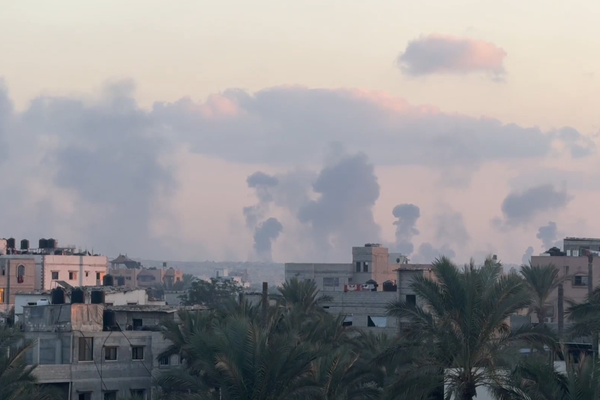
If not for the brown charring of the University of Sydney’s quadrangle lawns, it would be difficult to imagine that at its peak hundreds of students had gathered there to camp out in protest against the war in Gaza.
For two months, the sandstone site was alive with marquees, colourful tents and makeshift kitchens. Protesters shared meals, held rallies and teach-ins, vowing they would not disband until the university disclosed and divested from weapons manufacturers and companies with links to Israel.
But on Tuesday morning, just a few dozen tents remained at Australia’s longest-running encampment, as campus security worked to dissemble the remaining sites.
The lawns were cordoned off and signs dotted around campus warned that students would be committing an offence if they were asked to leave and refused.
Just a small group of protesters from the Sydney University Muslim Students’ Association (SUMSA) sat steadfast amid the tents, declaring at a rally last week they would not be moved unless the university upheld their demands, or if the police intervened.
In a letter to colleagues on Monday, the vice-chancellor, Mark Scott, said the camp had been advised to disband in order for the university to prepare for the upcoming Welcome Fest, a three-day festival held the week prior to the beginning of the second semester.
“Since 24 April when the encampment began, we’ve repeatedly stated that we support the right to peaceful protest, provided it doesn’t cause significant disruption to core university operations,” he wrote.
“We consider preparations for Welcome Fest to be core university operations.”
The same day, the grassroots groups Students for Palestine, Students Against War and the Student Representative Council released a joint statement confirming the university had shut down the encampment. They also announced a student general meeting set for August to demand the university cut its ties with Israel.
“We are incredibly proud of our achievement in involving hundreds of new and diverse students in activism for Gaza, and amounting significant pressure on the university,” the statement said .
“For weeks the camp has been issued cease and desist letters, two students have been suspended, security has removed tents … as such, the camp is closing off today, and over the course of this week people will be retrieving their belongings.”
But cracks quickly emerged, with SUMSA swiftly issuing a statement on Monday evening, countering that “the encampment has not ended”.
The statement, which was also attributed to other Muslim students associations at the University of NSW, Western Sydney University and the University of Technology Sydney, said it was “aware” other student groups had suggested the encampment had ended but “this is not the case”.
“SUMSA will continue the encampment … SUMSA is in direct communication with the university to accelerate the negotiation process and we are looking to have a few significant updates in the coming days.”
Students Against War, a campaign group with ties to the socialist organisation Solidarity, also clarified it did not endorse the statement and condemned university “threats against the camp.”.
“There’s been no camp meeting held to make the decision,” it wrote.
“Students including members of SUMSA continue to camp.
“We stand with their rights to do so and condemn management threats against camp.”
Guardian Australia understands the university is unwilling to escalate with remaining protesters or involve police, hoping instead to reach a negotiated agreement.
The university had previously offered the encampment a chance to participate in a working group to review its investment portfolio related to defence and security, and a Senate divestment discussion which had previously led to the university’s decision to divest from investment interests in modern slavery, cluster munitions, fossil fuels and tobacco.
The University of Melbourne, the University of Queensland and Curtin University disclosed their research ties in order to successfully negotiate for their camps to cease.
Scott went further, proposing doubling expenditure over three years to support academics and PhD students under the Scholars at Risk program, which advocates for free thinking on campuses, and to expand its truth-telling processes with “reference to current events and their historical relevance”.
But camp organisers voted to reject the offer, declaring “disclosure is only an admission of the university’s ties to Israel and genocide, not a commitment to ending those ties”.
In his letter to staff, Scott also acknowledged allegations in the media that external influences were targeting the protest encampment, confirming they were being treated seriously and advice was being sought from authorities.
“Since the protest encampment began, we’ve been in regular contact with New South Wales police and we participated in the recent briefing of the Universities Foreign Interference Taskforce,” he wrote.
A University of Sydney spokesperson said disciplinary action had been taken on “a small number of camp-related matters” and class disruptions, adding the encampment had also been joined by people who were not staff or students.
“While members of the public are welcome on our campus, all visitors are expected to assemble and protest peacefully and express their views in a thoughtful and considered manner,” they said.
“We reserve the right to withdraw permission for them to access our campuses. The police or other regulators may also choose to prosecute.”







